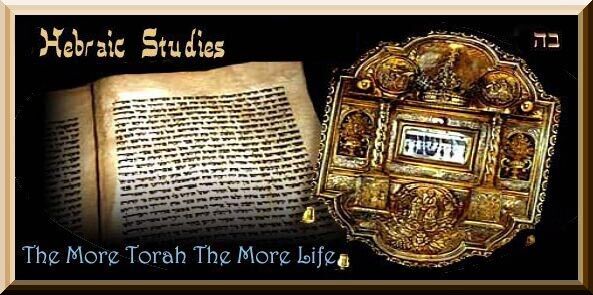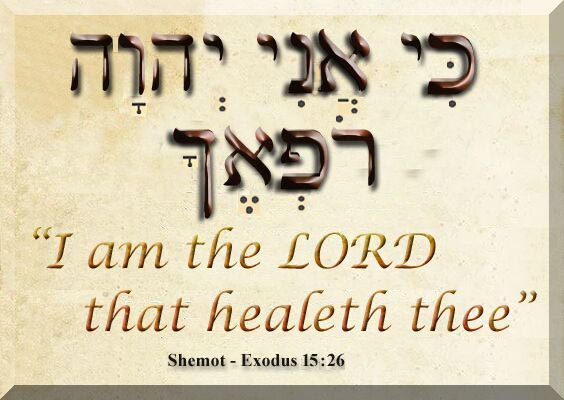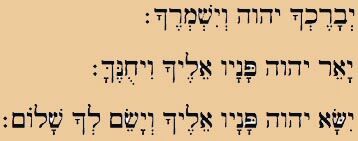Hebraic Studies – He Who Heals
Please Note: Firefox and some other search engines are not suitable
Use Google Chrome for this page to load
perfectly!

Please do NOT visit this site on Shabbat or on a
Please Note: On this page I may show the four
letter blessed *“Memorial
Name” of the Almighty in Ivrit - ![]() - Y-H-V-H, which we
usually pronounce as “Adonai” or “HaShem”.
At all times treat the most blessed Name with great sanctity and when we even
see the Name, we should say “blessed be His Sanctified Name.”
- Y-H-V-H, which we
usually pronounce as “Adonai” or “HaShem”.
At all times treat the most blessed Name with great sanctity and when we even
see the Name, we should say “blessed be His Sanctified Name.”
*“This is My Name forever,
and this is My memorial to all generations.”
Shemot - Exodus 3:15.

Please Note: I will be using the “Jewish Publication Society” (JPS version of the Torah/Tanakh) with some minor updates.
For who may not use a Hebrew/English Torah/Tanakh and have a Bible the verse may occasionally differ by one up or down
“He Who Heals”
With
“If thou wilt diligently hearken to the
voice of ![]() thy God, and wilt do that which is right in
His eyes, and wilt give ear to His commandments, and keep all His statutes, I
will put none of the diseases upon thee, which I have put upon the Egyptians;
for I am
thy God, and wilt do that which is right in
His eyes, and wilt give ear to His commandments, and keep all His statutes, I
will put none of the diseases upon thee, which I have put upon the Egyptians;
for I am ![]() that healeth
thee” Shemot
- Exodus 15:26 (JPS version of
the Torah with corrections).
that healeth
thee” Shemot
- Exodus 15:26 (JPS version of
the Torah with corrections).
This verse, where Elohim declares: “I am ![]() that healeth thee,” is sandwiched between the
Israelites’ moaning about the bitter waters of Shemot
- Exodus 15:23-24 and their complaining that they would have been better off
back in Egypt in Shemot - Exodus 16:2 & 3).
that healeth thee,” is sandwiched between the
Israelites’ moaning about the bitter waters of Shemot
- Exodus 15:23-24 and their complaining that they would have been better off
back in Egypt in Shemot - Exodus 16:2 & 3).
Does Elohim’s
declaration as healer in Shemot - Exodus 15:26 offer
a source of consolation to the fearful Israelites? He says
that if you will heed to ![]() your Elohim
diligently then He will not bring upon you any of the diseases that He brought
upon the Egyptians.
your Elohim
diligently then He will not bring upon you any of the diseases that He brought
upon the Egyptians.
This is the correct
understanding of this verse in the context of the Israelites’
irreverence. They have just witnessed Elohim's might
in their redemption at the parting of the sea, and yet they have already lost
faith that Elohim will protect them on their journey.
Therefore this verse is not so much about Elohim’s
healing power, but of Elohim’s omnipotence,
capable of punishing or healing, creating or destroying.
Thus the verse is clearly
a threat in its context. It is indicative of the interactive and demonstrative
Presence of Elohim in Torah, which has been more
elusive in general Torah teaching history.
However, there is no doubt
regarding the second part of the verse, “for I the Eternal am your
healer," stating that "this is a promise." Ibn
Ezra understands the verse as saying: “I am ![]() that healeth thee” just as “I healed the bitter water”. You need no other
healer, for no doctor could have ‘cured’ that water.
that healeth thee” just as “I healed the bitter water”. You need no other
healer, for no doctor could have ‘cured’ that water.
Thus we must be faithful
and prayerful to Elohim, and love Elohim,
for ![]() Elohim,
blessed be His Sanctified name, will treat you well. Elohim’s
transformation of the bitter waters was an example of His miraculous wonders
and of the divine reward that comes to those who devote themselves to Him. Doctors
heal through medicine and procedures; whilst Elohim’s
healing comes from being in close and a loving on-going relationship.
Elohim,
blessed be His Sanctified name, will treat you well. Elohim’s
transformation of the bitter waters was an example of His miraculous wonders
and of the divine reward that comes to those who devote themselves to Him. Doctors
heal through medicine and procedures; whilst Elohim’s
healing comes from being in close and a loving on-going relationship.
A more practical
understanding of the said verse, suggests that it is a
prescription for how to live a good life in faith. Personally I believe that; I
can only teach you the Torah and its commandments, for it contains the best way
that your will be greatly improved and at the same time be saved by living by
them, I am like a doctor who tells someone, “Don’t eat this
particular food, for it will put you at risk for this particular
illness.” Healing may not just be the main sign of Elohim’s miraculous powers, but as a result of a life
well lived. For the truth is that in a way, Elohim
helps those who help themselves. Elohim offers us
with a guide that can lead us to a healing life, if we choose to follow His
ways.
Many of the rabbinate is
predicated on the premise that Judaism offers the Halachah
(“law”
from the Hebrew root meaning “to walk”) as a path to fulfillment, a road map to connect
to Elohim. Judaism teaches that we all have an
obligation to study Halachah and choose from it those
things that strengthen our bonds to Elohim, blessed
be He, and the community.
I am well aware that part
of me yearned for a miraculous healing from Elohim
and there certainly has been healing in my heart, although knowing that as yet Elohim has not healed all, but His blessed presence has
made life a joy!
![]()
We all need a little more faith in our lives and take some time to share within our wonderful Jewish community, and find the peace that allows us to persevere our faith and keep up our prayers, and enjoy the blessings that comes with lighting the Shabbat and Yom Tovim lights, and then enjoy the Kiddush together with the Mishpacha (family) if that is at all possible.
Shalom - ![]() and …
and …

May … “![]() bless thee, and keep thee;
bless thee, and keep thee;
![]() make His face to shine upon thee, and be
gracious unto thee;
make His face to shine upon thee, and be
gracious unto thee;
![]() lift up His countenance upon thee, and give thee
peace”
lift up His countenance upon thee, and give thee
peace”
And remember our motto seen on the logo at the
top of this page: “The More Torah, the More Life”, for ![]() Elohim,
blessed be His Sanctified Name, is the one who gave us our Life!”
Elohim,
blessed be His Sanctified Name, is the one who gave us our Life!”
Rabbi

![]()
Return to our MAIN PAGE or go to our Main Index


